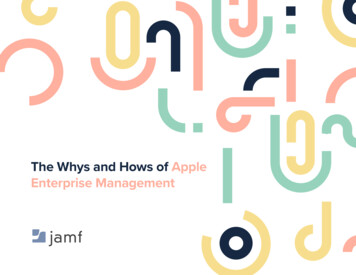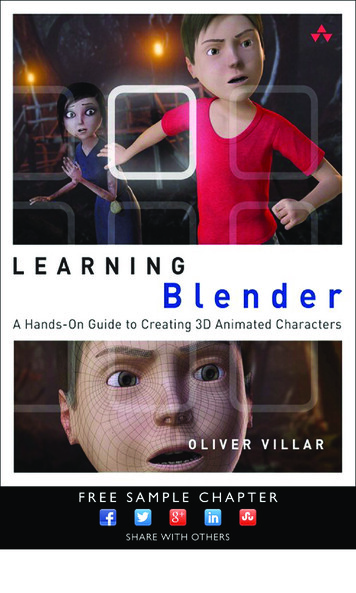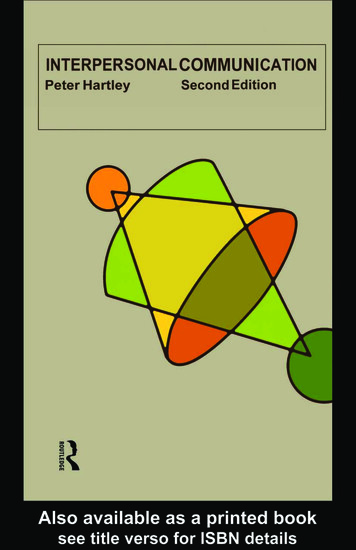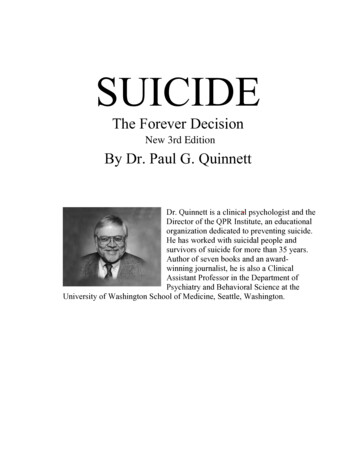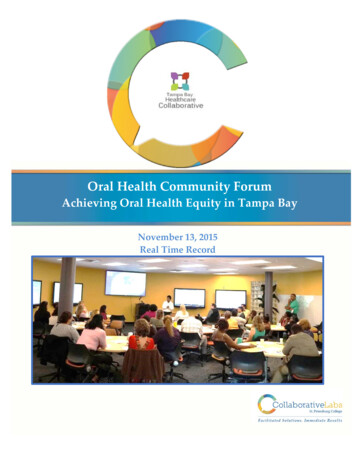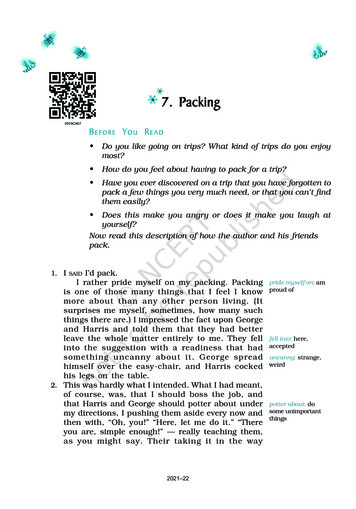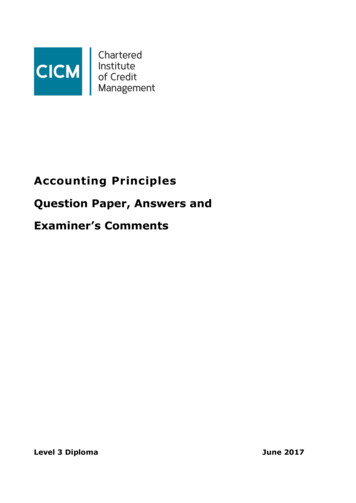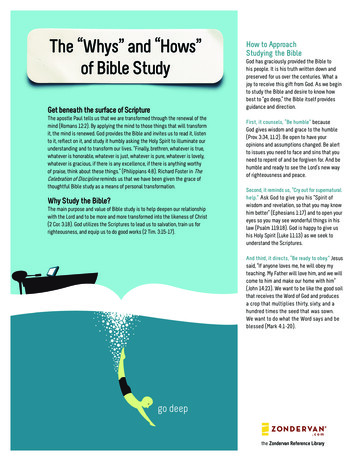
Transcription
The “Whys” and “Hows”of Bible StudyGet beneath the surface of ScriptureThe apostle Paul tells us that we are transformed through the renewal of themind (Romans 12:2). By applying the mind to those things that will transformit, the mind is renewed. God provides the Bible and invites us to read it, listento it, reflect on it, and study it humbly asking the Holy Spirit to illuminate ourunderstanding and to transform our lives. “Finally, brethren, whatever is true,whatever is honorable, whatever is just, whatever is pure, whatever is lovely,whatever is gracious, if there is any excellence, if there is anything worthyof praise, think about these things.” (Philippians 4:8). Richard Foster in TheCelebration of Discipline reminds us that we have been given the grace ofthoughtful Bible study as a means of personal transformation.Why Study the Bible?The main purpose and value of Bible study is to help deepen our relationshipwith the Lord and to be more and more transformed into the likeness of Christ(2 Cor. 3:18). God utilizes the Scriptures to lead us to salvation, train us forrighteousness, and equip us to do good works (2 Tim. 3:15-17).How to ApproachStudying the BibleGod has graciously provided the Bible tohis people. It is his truth written down andpreserved for us over the centuries. What ajoy to receive this gift from God. As we beginto study the Bible and desire to know howbest to “go deep,” the Bible itself providesguidance and direction.First, it counsels, “Be humble” becauseGod gives wisdom and grace to the humble(Prov. 3:34, 11:2). Be open to have youropinions and assumptions changed. Be alertto issues you need to face and sins that youneed to repent of and be forgiven for. And behumble and ready to see the Lord’s new wayof righteousness and peace.Second, it reminds us, “Cry out for supernaturalhelp.” Ask God to give you his “Spirit ofwisdom and revelation, so that you may knowhim better” (Ephesians 1:17) and to open youreyes so you may see wonderful things in hislaw (Psalm 119:18). God is happy to give ushis Holy Spirit (Luke 11:13) as we seek tounderstand the Scriptures.And third, it directs, “Be ready to obey.” Jesussaid, “If anyone loves me, he will obey myteaching. My Father will love him, and we willcome to him and make our home with him”(John 14:23). We want to be like the good soilthat receives the Word of God and producesa crop that multiplies thirty, sixty, and ahundred times the seed that was sown.We want to do what the Word says and beblessed (Mark 4:1-20).go deepthe Zondervan Reference Library
The “Hows” of Bible StudyAdditional Preparation for Dynamic Bible StudyRick Warren, in his helpful book Rick Warren’s Bible Study Methods,reminds us that once you understand the basic principles of Bible studyit’s simple to do. He outlines the following five general principles.Here are four reminders of things to do to get the most benefit fromyour Bible study.1. The secret of dynamic Bible study is learning how to ask theright kinds of questions. Asking questions is a skill you candevelop. The more questions you ask about the text you study,the more you will get out of it. One benefit of studying the Bibleis that you begin to develop a more inquisitive mind.2. D ynamic Bible study involves writing down what you haveobserved and discovered. You cannot study the Bible withoutwriting your insights down. It’s the difference between Biblereading and Bible study. In reading the Bible you simply readthrough a selected portion of Scripture. In Bible study you takeextensive notes recording your discoveries and the implicationsof text on your life.3. The ultimate goal of dynamic Bible study is application, not justinterpretation. We don’t want to settle for understanding alone; wewant to apply the biblical principles to our daily living. The Bible hasbeen given to change our character and bring it more in conformitywith Jesus Christ. We want to know both the Word of God and the Godof the Word. In your Bible study ask yourself: What attitude do I needto change? What do I need to stop doing or start doing? What thingsdo I need to stop believing and start believing? What relationships doI need to improve? How should I be serving others? As you start Biblestudy commit yourself to understanding it and then obeying it.4. Dynamic Bible study means God’s word must be studiedregularly and systematically. The best and most fruitful typeof Bible study is one that reviews a whole book of the Bible,an investigation of an important word in the Bible like “hope”or “disciple,” or a complete study of a biblical character likeMoses or Peter. Commit yourself to interpret the Bible honestly,carefully, and consistently, instead of picking out verses thatsupport what we would like the truth to be. Three books that arehelpful for this are How to Read the Bible For All Its Worth byGordon Fee and Douglas Stuart, Understanding the Bible by JohnR.W. Stott, and Applying the Bible by Jack Kuhatschek.5. In dynamic Bible study you will never exhaust the riches in anyone passage of Scripture. You will be able to study the samepassage of Scripture over and over again, dig into it, ask lots ofquestions, gain meaningful insights, leave it for three or fourmonths—and when you return to it you will make more discoveries!So stick with it! Bible study is hard work. But if you are diligentand patient, you will gain the deep and lasting benefits ofgreater understanding of the Bible and a character formed bythe Lord Jesus Christ.1. Schedule your Bible study time. Set aside a specific amount oftime to study the Bible each week. Put study into your weeklyschedule and schedule it when you are at your best physically,emotionally, and intellectually, and when you can be undistractedand unhurried.2. Keep a notebook to record your observations and discoveries. It’scritical to write down your discoveries and the implications of thetext to your daily life.3. G et the right Bible reference tools and build a library. When youfirst start out to make Bible study a priority in your life, make aninvestment in a Bible handbook (an “overview” resource), a Bibleconcordance (a “find” resource), and a Bible dictionary (an“understand” resource). Bible reference tools help us handleGod’s Word correctly (2 Tim. 2:15) and to study it with thereverence and care it deserves.4. Spend a short time in prayer before each study. Ask God to cleanseyour life from all known sin and to fill you with the Holy Spirit. Throughstudying the Bible you have the privilege of direct communicationwith the Author and Revealer. Ask God to guide you into the Wordof God. Memorize Psalm 119:18 and use it before each study:“Open my eyes that I may see wonderful things in your law.”So let’s commit ourselves toenter the study of the Biblehumbly, prayerfully, and witha desire to obey in order todeepen our relationship withthe Lord and to be transformedinto the likeness of Christ.the Zondervan Reference Library
The “Go Deep” Core LibrarySo Many Reference Books – What’s the Difference?In your desire to “go deep” and get beneath the surfaceof Scripture, Zondervan offers five unique resources. Wecall them the Core Library. These resources will give youan overview of the Bible (Bible Handbook), help you findverses and passages in the Bible (Concordance and TopicalBible), and help you understand things in the Bible (BibleDictionary) by providing more specific information. As youthink about building your Core Library consider these keyorganizational words: “Overview,” “Find,” and “Understand.”The Overview category is comprised of resources that give you the essentialsfor Bible study. These resources give you the big picture of Scripture in one place.The Find category is comprised of resources that help you locate things in thetext. These resources vary from topical lists to detailed collections of every versein Scripture.The Understand category is comprised of the resources that help you dig deeplyinto Scripture and comprehend difficult passages.1. Bible HandbookA Bible handbook gives a clearly written overview of the Bible. It is a companionto Bible reading. It’s arranged in the order of the books of the Bible. It providesbackground before you read through a Bible book, commentary and illustrationsas you read, and topical and historical notes to expand your understanding.2. Topical BibleA topical Bible is also a find resource and a guide to different subjects addressed in the Bible. Under “faith,” it will list not only the most important verseswhere the word “faith” is found, but also verses that talk about faith withoutusing the word, for example Genesis 15:6, “Abraham believed the LORD.”3. ConcordanceA concordance helps you find words in the Bible. It lists common words found in theBible and shows the places where they occur. For example, under the entry “faith,”you’d find the locations in the Bible where the word “faith” is used. A concordanceenables you to do word studies as well as locate verses you vaguely remember.4. Bible DictionaryA Bible dictionary is an understand resource. It gives more detailed informationabout people, places, words, and events in the Bible. You could use it to learnmore about what the Bible says about children, for example, or about Peter, orEgypt, or miracles.5. CommentaryA commentary is also an understand resource. It is a single or multi-volume workthat explains the meaning of Bible passages.the Zondervan Reference Library
1. Bible HandbookThe first Bible handbook ever published was Halley’s Bible Handbook. It was arevolutionary concept that came out of Dr. Halley’s desire to get people to read theBible with more understanding. It remains a perennial bestseller to this day. A new,revised edition of Halley’s Bible Handbook is now available from Zondervan.How to ChooseA Bible handbook is arranged in the order of the books of the Bible, and typicallycontains maps, charts, indexes, essays on special topics, outlines of Bible books, briefcommentary on the Bible text, and cross-references to other parts of the Handbook.Ask Yourself I s it more devotional or informational? Which am I looking for? H ow much more content does it have than my study Bible? Is it too basicfor my needs? D o I plan to use it permanently or temporarily? (If you will be using itpermanently, get the best you can afford.) I s it well indexed? A re the illustrations and charts helpful and easy to use? I s it readable and usable?Using a Bible HandbookWe recommend a Bible handbook as a primary reference book (after the studyBible) because it is comprehensive and easy to use. To use a handbook, yousimply open it to the book of the Bible you’re reading. All of the relevantinformation is right there. You don’t need any advanced knowledge to use it.A handbook is an ideal basic companion to Bible reading, especially forpeople who are less familiar with the Bible.How to Choose2. Topical BibleYou can use a topical Bible with any translation of the Bible, even if it quotes from aparticular translation. Some topical Bibles list only biblical and theological topics,while others focus more on practical topics. Make sure you choose the kind youwant. The size of a topical Bible doesn’t necessarily reflect the number of topicsor references it contains. A small one that gives only verse references mayactually be more complete than a big one that prints out the full text of manyverses. Since a concordance and a topical Bible complement each other, werecommend that you use them together, rather than choosing one over the other.Ask Yourself W hich one best addresses the subjects I want to study? H ow much information does each topical Bible contain? D oes the editor’s choice of topics and their relative length seem balanced? A re the topics well subdivided and indexed? A re the Bible verses printed out in full? How important is this feature to me? W hen was it originally published and last revised? W hich one seems most user-friendly?Using a Topical BibleIf you want to study a topic such as baptism, a concordance will only give you alist of all the verses in which the word “baptism” occurs. A topical Bible, on theother hand, will help you also find verses and passages in the Bible that talkabout the subject of baptism without using the word “baptism” as such.
3. ConcordanceHow to ChooseA concordance is an index to the words foundin the Bible. It lists the references of the verseswhere they occur, and a piece of each sentencewhere the word occurs.Unlike most Bible reference books, a concordanceis based on a specific Bible translation, e.g., NIV,KJV, NASB, etc. It should be used ONLY with thattranslation. The Greek word that is translated“love” in the NIV, for example, is usually translatedas “charity” in the KJV and so would be listed in adifferent part of the concordance. If you were raisedon the KJV but now use a modern translation,you may want a concordance for each so thatyou can also find verses you vaguely rememberfrom your KJV days.Ask Yourself W hat translation of the Bible am I using?For most effective Bible study, you needa concordance that is based on the Bibleversion you use. D o I want to use it to find a verse or to doword studies? Is there a numbering system? D o I own a computer? Software can performthe same functions as a concordance withgreater speed and flexibility.Concordances come in different sizes, ranging from brief, abridged concordances inthe back of most study Bibles to exhaustive concordances of almost 2,000 pages.There are four basic types: H andy, concise, or compact concordances are in some way abridged. Only themost important words found in the Bible are included, and only the most importantreferences for those words are listed. This type of concordance may be adequateif you only use this tool occasionally to find a Bible verse. A complete concordance is still abridged, but in a different way. Not all wordsfound in the Bible are included, but the list of references for each of the wordsthat is included is complete. If you want to do English word studies, a completeconcordance is a must, though an exhaustive concordance is even better. A n unabridged concordance indexes every word and lists every reference. A n exhaustive concordance indexes every word and lists every reference. It also showswhich Hebrew or Greek word is translated for every occurrence of every English wordin the Bible version. If you want to do in-depth word studies based on the occurrencesof Greek and Hebrew words, an exhaustive concordance is indispensable.The best-known exhaustive concordance is Strong’s, which is based on the KingJames Version. The Strongest NIV Exhaustive Concordance is the only trueexhaustive concordance to any version other than the KJV.A very useful feature of exhaustive concordances is a numbering system whichassigns a specific number to each of the Greek and Hebrew words found in theBible. The Strongest NIV Exhaustive Concordance uses the Goodrick/Kohlenbergernumbering system, which reflects modern linguistic standards and is increasinglyused in newer reference works. Strong’s numbering system is out dated andinadequate by modern standards, but is still widely used. There are alsoconcordances that are based directly on the Greek and Hebrew text.Using a ConcordanceA concordance is meant to be used together with your Bible. Don’t do a word studywith only your concordance. Always read the context in which a verse is found, notjust the verse or portion of the verse that appears in the concordance. For example,Psalm 14:1 says, “There is no God” — but the context tells you that this is what thefool says. When you do a word study, read the verses you find, in their context, inseveral translations. Very few words — especially abstract words — have only oneclear-cut meaning.If you are unable to locate a word, look for its dictionary form. For example, if youcant find “went,” look for “go.” Look up other inflected forms or roots of words. Manyconcordances direct you to the varous inflected forms of words, e.g. come, comes,coming, came, or even to words of the same root, e.g. heart, faint-hearted, half-hearted.By looking up the other forms or spellings, you can do a more thorough word orconcept study. When doing a word study, use an English thesaurus to find synonymsand related words. For example, under “faith,” a thesaurus will list words such asbelief, hope, confidence, assurance, dependence, etc.
4. Bible DictionaryHow to ChooseIt’s helpful to have a Bible dictionary that matches the version(s) of the Bible thatyou use. The spelling of some people and place names may be different from onetranslation to another, and sometimes words are translated differently altogether.For example, there’s a Hebrew word that the KJV, NIV, NASB, and NRSV translateas “cormorant,” “desert owl,” “pelican,” and “hedgehog,” respectively.When you’re comparing dictionaries, pick a few words — for example a place name likeShiloh; a person, perhaps Mary; an abstract biblical word such as grace; and a theologicalword like Trinity — and read the entries for these words in several dictionaries.It can be helpful to have more than one Bible dictionary, especially if they’resomewhat different in focus or orientation.A Bible dictionary is more like an encyclopediathan like a regular English dictionary. It givesdefinitions and pronunciations, but it also providesbiblical, historical, and theological informationon people, places, words, and events in the Bible,all in alphabetical order. A Bible encyclopedia issimply a multi-volume Bible dictionary.Bible dictionaries and encyclopedias, such asthe New International Bible Dictionary and theZondervan Encyclopedia of the Bible, don’t defineevery word of the Bible. They focus mostly onnouns — people, places, and things — althoughsome also have articles on theological terms thatare not in the Bible, such as “Trinity.”Look for thorough cross-referencing. If you don’t know the exact word to look up, agood cross-reference system will anticipate many of your guesses and help directyou to the topic you’re looking for.Ask Yourself W hat kind of information will I most likely want to look up? H ow many articles does the dictionary have? Do I prefer many shorter articles,or fewer longer ones? D oes it have good cross-references? What size dictionary is best for me?What type size and page layout do I like? D o I want a dictionary that uses more every day English or a more scholarly one? W hen was the dictionary originally published and last revised? Historical, archaeological, and linguistic knowledge has grown dramatically over the past decades.Using a Bible DictionaryCross-references or cross-indexing can help you find articles of related interest.An article about Jesus might end with “See also ATONEMENT, MESSIAH, MIRACLES,PARABLES, SECOND COMING,” to name just a few. A good English dictionary is anindispensable tool for use with your Bible dictionary. There may be unfamiliar wordsin the Bible that you won’t find in a Bible dictionary. Take, for example, Isaiah 14:23in the New English Bible: “I will make her a haunt of the bustard, a waste of fen, andsweep her with the besom of destruction.” Your Bible dictionary probably won’t helpyou here, but your English dictionary will. An English thesaurus is another valuabletool. For example, if you can’t find an article on “Gentiles” in your Bible dictionary, athesaurus may suggest “heathen” as a synonym, and that may be the right headingin the Bible dictionary.
5. CommentaryHow to ChooseChoosing a commentary, perhaps more than choosing other Bible reference books,is a personal matter. The key issue is which commentary answers the kinds ofquestions you are likely to ask. As usual, you should take time to look at what’savailable. Compare before you buy. One consideration for comparison is whattheological perspective the author is writing from. Another consideration is thedate of publication — some historical and cultural information in older commentariesmight be outdated or incorrect, but the devotional material in them would betimeless. Commentaries come in many different sizes. You can get a commentaryor set on the whole Bible or for individual books of the Bible.Using a CommentaryCommentaries give the commentator’s perspective on passages in the Bible. They should neverbe the first books you check when doing a Biblestudy—if you do, you start with somebody else’sconclusions rather than finding your own. There isno substitute for first-hand study, using the toolsof the Core Library and relying on the illuminatingpresence of the Holy Spirit. On the other hand,commentaries can be helpful in supplementingyour own study by giving you other perspectivesand additional insights.Devotional commentaries, such as Matthew Henry’s Commentary, focus on the spiritualsignificance of the text for our lives. Expository commentaries focus on explainingthe text. Most expository commentaries, such as the Expositor’s Bible Commentary,use historical, geographical, and cultural information as well as discussions of theoriginal languages to explain the text. Exegetical or critical commentaries focusprimarily on technical issues related to the Greek or Hebrew text and its interpretationand are written primarily for specialists.Ask Yourself I s the Bible text included? Is it the author’s own translation? I s there an explanation of the text? I s historical, geographical, and cultural information included? A re there word studies and grammatical explanations? A re there critical notes dealing with textual criticism; form, literary, and other“higher” criticisms; history and comparison of different interpretations? A re footnotes, bibliography, and indexes included?
The “Hows” of Bible Study Rick Warren, in his helpful book Rick Warren’s Bible Study Methods, reminds us that once you understand the basic principles of Bible study it’s simple to do. He outlines the following five general principles. 1. The secret of dynamic Bible s

